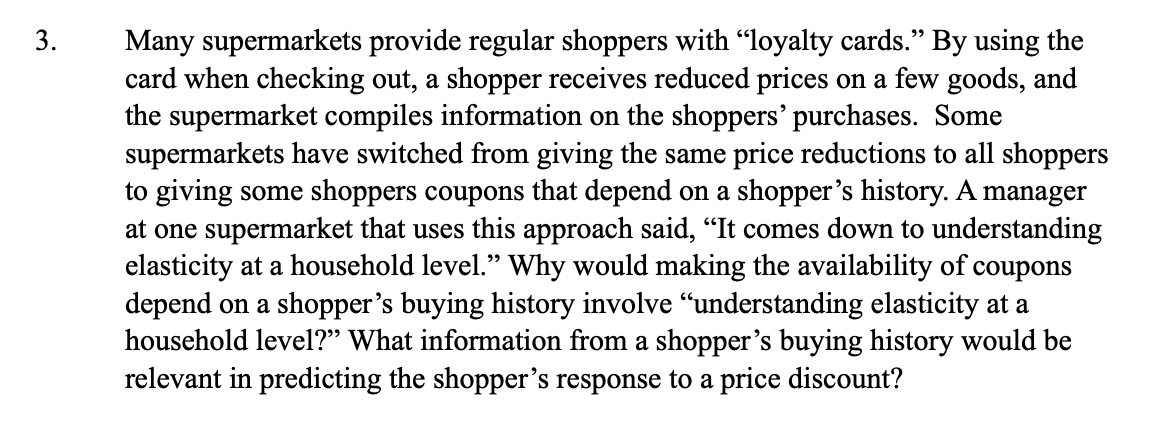Many supermarkets provide regular shoppers with “loyalty cards." By using the card when checking out, a shopper receives reduced prices on a few goods, and the supermarket compiles information on the shoppers’ purchases. Some supermarkets have switched from giving the same price reductions to all shoppers to giving some shoppers coupons that depend on a shopper's history. A manager at one supermarket that uses this approach said, "It comes down to understanding elasticity at a household level." Why would making the availability of coupons depend on a shopper's buying history involve “understanding elasticity at a household level?" What information from a shopper's buying history would be relevant in predicting the shopper's response to a price discount? 55
Many supermarkets provide regular shoppers with “loyalty cards." By using the card when checking out, a shopper receives reduced prices on a few goods, and the supermarket compiles information on the shoppers’ purchases. Some supermarkets have switched from giving the same price reductions to all shoppers to giving some shoppers coupons that depend on a shopper's history. A manager at one supermarket that uses this approach said, "It comes down to understanding elasticity at a household level." Why would making the availability of coupons depend on a shopper's buying history involve “understanding elasticity at a household level?" What information from a shopper's buying history would be relevant in predicting the shopper's response to a price discount? 55
Principles of Economics 2e
2nd Edition
ISBN:9781947172364
Author:Steven A. Greenlaw; David Shapiro
Publisher:Steven A. Greenlaw; David Shapiro
Chapter10: Monopolistic Competition And Oligopoly
Section: Chapter Questions
Problem 16CTQ: Would you rather have efficiency or variety? That is, one opportunity cost of the variety of...
Related questions
Question
Can you answer this for me please?

Transcribed Image Text:3.
Many supermarkets provide regular shoppers with "loyalty cards." By using the
card when checking out, a shopper receives reduced prices on a few goods, and
the supermarket compiles information on the shoppers' purchases. Some
supermarkets have switched from giving the same price reductions to all shoppers
to giving some shoppers coupons that depend on a shopper's history. A manager
at one supermarket that uses this approach said, "It comes down to understanding
elasticity at a household level." Why would making the availability of coupons
depend on a shopper's buying history involve "understanding elasticity at a
household level?" What information from a shopper's buying history would be
relevant in predicting the shopper's response to a price discount?
Expert Solution
This question has been solved!
Explore an expertly crafted, step-by-step solution for a thorough understanding of key concepts.
This is a popular solution!
Trending now
This is a popular solution!
Step by step
Solved in 2 steps

Knowledge Booster
Learn more about
Need a deep-dive on the concept behind this application? Look no further. Learn more about this topic, economics and related others by exploring similar questions and additional content below.Recommended textbooks for you

Principles of Economics 2e
Economics
ISBN:
9781947172364
Author:
Steven A. Greenlaw; David Shapiro
Publisher:
OpenStax

Economics: Private and Public Choice (MindTap Cou…
Economics
ISBN:
9781305506725
Author:
James D. Gwartney, Richard L. Stroup, Russell S. Sobel, David A. Macpherson
Publisher:
Cengage Learning

Microeconomics: Private and Public Choice (MindTa…
Economics
ISBN:
9781305506893
Author:
James D. Gwartney, Richard L. Stroup, Russell S. Sobel, David A. Macpherson
Publisher:
Cengage Learning

Principles of Economics 2e
Economics
ISBN:
9781947172364
Author:
Steven A. Greenlaw; David Shapiro
Publisher:
OpenStax

Economics: Private and Public Choice (MindTap Cou…
Economics
ISBN:
9781305506725
Author:
James D. Gwartney, Richard L. Stroup, Russell S. Sobel, David A. Macpherson
Publisher:
Cengage Learning

Microeconomics: Private and Public Choice (MindTa…
Economics
ISBN:
9781305506893
Author:
James D. Gwartney, Richard L. Stroup, Russell S. Sobel, David A. Macpherson
Publisher:
Cengage Learning